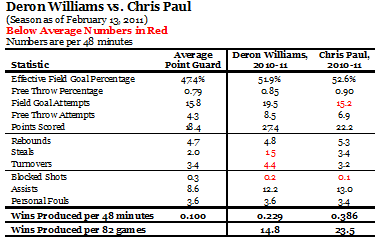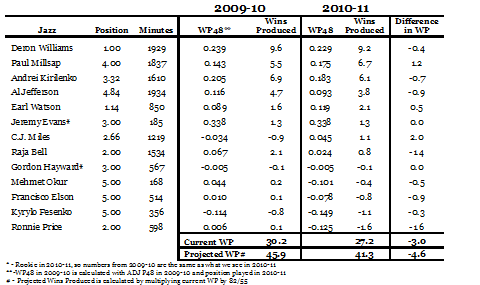
Back in 2005, the Utah Jazz held the third pick in the NBA draft. John Stockton had retired after the 2002-03 season, so it was clear the Jazz needed a point guard. And two point guards were considered potential choices: Deron Williams from Illinois and Chris Paul from Wake Forest.
The Jazz ultimately decided to take Deron Williams (with Chris Paul going to the Hornets with the very next pick). Two characteristics of Williams might explain this choice. First, Williams was the bigger player (a recent study I published with Aju Fenn and Stacey Brook noted that a player's height -- relative to his position -- positively impacts where a player is drafted in the NBA). Furthermore, Williams had just appeared in the Final Four (the same study revealed that appearing in the Final Four the year a player is drafted also has a positive impact on draft position).
As a member of the Utah Jazz, Deron Williams has apparently justified this choice. Across his first five seasons, Williams has produced 48.9 wins (click here for how Wins Produced is calculated). And this year, Williams leads the Utah Jazz with 9.2 Wins Produced (after 55 games).
Although the Jazz are probably not disappointed with Williams, his production pales in comparison to Chris Paul. Across Paul's first five seasons he has produced 94.8 wins; and this season Paul has produced 16.1 wins (after 56 games). If Paul maintains this pace, he will produce 23.5 wins across the entire 2010-11 season. Such production compares favorably to what Magic Johnson (24.3 Wins Produced) and John Stockton (20.2 Wins Produced) produced in their respective 6th season. Yes, Deron Williams is good. But Chris Paul ranks among the all-time great point guards to ever play the game.
When we turn to the individual numbers, we can see why Paul's production eclipses what we see from Williams. Relative to the average point guard -- as the following table indicates -- Williams and Paul are both above average with respect to shooting efficiency (from the field and line).

But when we move past scoring, we see that Paul also excels with respect to rebounds, steals, and turnovers. Consequently, Paul is able to produce more wins than Williams (who doesn't do as well with respect to rebounds, steals, and turnovers).
When we consider all the numbers, it seems clear that Paul does more than Williams. But there is one number people primarily focus upon in evaluating players. Player evaluation in the NBA (as several published studies have indicated) is dominated by points scored per game. And when we consider this one number, Williams -- who scored 21.6 points per game -- clearly has the advantage (Paul only scores 16.5 points per game). Given the primacy of points scored, one suspects that many people see Williams as the better point guard. Certainly Williams is considered by many to be the best point guard in the NBA.
And this perception might explain the problems with the Utah Jazz this season. Last season the Utah Jazz won 53 games and advanced to the Western Conference semi-finals (where Utah lost to the LA Lakers, the team that ultimately won the NBA title). This season the Jazz started 15-5, but have only won 16 of their last 34 games.
As a resident of Utah I have been able to read about this team each morning in the Salt Lake City Tribune. And after each loss the story has been very much the same. Deron Williams would express his frustration, and the media, fans, and players would wonder why this team wasn't better.
Much of this discussion revealed that there was a disconnect between how good the Jazz thought they should be and the reality of the team's season. Yes, the Jazz saw Carlos Boozer depart this past summer. But the team still had Williams, (once again) a player people believe ranks among the very best point guards in the game. And with the addition of Al Jefferson, this team was supposed to remain a contender in the West. And when that didn't happen (and I noted back in October that Jefferson was likely to offer much less than Boozer), frustration began to build.
This frustration, though, might have been mitigated had the Jazz entered the season with a more realistic picture of what Williams brought to the table and the overall quality of the team. Consider the following table, which reports each player's Wins Produced in 2010-11 as well as what one might expect from this team had each player's performance (per 48 minutes) from 2009-10 not changed.

As one can see, the performance of these players last season suggests the Jazz should have won about 30 of their first 55 games. The team has actually won 31 games, but when we turn to offensive efficiency (points scored per possession) and defensive efficiency (points surrendered per possession) we see a somewhat different story. After the team's game against Phoenix on Friday night, the Jazz had only scored 104.9 points per 100 possessions while allowing 105.1 points per 100 possessions. And these two marks suggest the Jazz should be about a 0.500 team this year. In sum, this team is not a contender in the Western Conference.
When we turn to the individual players we see why the Jazz are not contenders. The Jazz have four players -- Williams, Paul Millsap, Andrei Kirilenko, and Al Jefferson -- who have produced 25.8 of the team's wins this year. And when we look at last year's performances, this quartet should have been expected to produce 26.6 wins. So these four players are productive (which was expected). Unfortunately, the rest of this team hasn't produced much at all (and that result was also expected).
So the Jazz should not have expected to contend this year. Clearly, though, they did. After all, the team employs an "elite" point guard. At least, that is the team's perception.
But it is Chris Paul who is actually the most productive point guard in the game. And had the Jazz chosen the correct "elite" point guard six years ago, the Jazz would currently be on pace to win 51 games; a mark closer to contending status.
If that was the case, one suspects that frustration the Jazz feel would be quite a bit less. And then maybe, Jerry Sloan would still be patrolling the sidelines.
After all, as J.A. Adande of ESPN.com reported: "Ninety-nine percent of the team loves Sloan. He didn't lose the team." The one percent -- as Adande reports -- is Williams. And the difference between the productivity of Williams (he is a very good point guard) and the perception of Williams (he is the "best" point guard in the game) is probably one factor contributing to the factors that led Sloan to depart the Utah Jazz. After all, if the Jazz were as good as they thought, there would be far less frustration and unhappiness in Utah.
